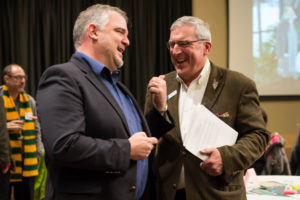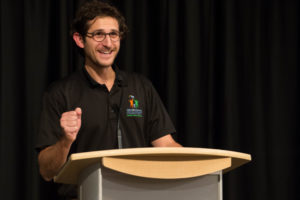A program that gives CSU students real-world experience facilitating group discussions on difficult community issues celebrated its 10th anniversary this week.
CSU’s Center for Public Deliberation marked its first decade at a Nov. 30 reception in the Lory Student Center attended by prominent guests such as Fort Collins Mayor Wade Troxell and state Sen. John Kefalas of Fort Collins.

“The CPD is the epitome of what the University should be doing,” CSU alumnus Troxell told the audience. “It’s totally engaged in the community.”
Since CPD Director Martín Carcasson launched the center in 2006, his model has been replicated around the country. The center fulfills multiple CSU missions. Student associates trained by the CPD get experience moderating dialogue on challenging topics with local governmental entities and other community groups. Those discussions simultaneously contribute to Carcasson’s research on public discourse and benefit the groups involved in the sessions. Almost 19,000 people have participated in CPD events over the past decade, providing services to the community that have been valued at about $1.5 million.
“The CPD model stands in sharp contrast to the metaphor of the ‘ivory tower,’ with its compartmentalized disciplines and students who sit in chairs, just waiting to be lectured to,” CSU President Tony Frank said in a video recorded for the event. “Students involved with the CPD are immersed in high-impact practices that drive real, in-depth learning. And the impact on our community is also profound, as the CPD builds our capacity to address community problem-solving around complex issues.”

Alumni Reflections
CSU graduates who participated in the CPD Student Associate Program also sing its praises.
“As an environmental planner for the City of Fort Collins, I am involved in conversations with a high level of emotion and controversy nearly every day,” said alumna Rebecca Everette. “The time I spent as a student associate at the Center for Public Deliberation gave me the awareness and skills to understand the various perspectives, values and concerns at play in dealing with challenging, high-stakes community issues.”
“I started my own business as a graphic facilitator in 2012, and a large part of my decision was based on the skills I learned and connections I made at the CPD — which I still use all the time,” added alumna Karina Branson, whose work has appeared in explainer videos about the CSU budget and other topics. “I literally would not be where I am today without the support of the CPD. Martín is so incredibly dedicated, talented and knowledgeable, but more than any of those things, he truly cares about the students and cultivating an experience and network that sticks with each of us for years.”
Taking chances

In addition to Troxell and Everette, speakers at the Nov. 30 event included CSU alumnus Jack Becker of the Denver Public Schools Office of Family and Community Engagement, who said Carcasson took a chance on him by making him a CPD student associate. Becker learned more about the CPD’s prominent national reputation during his time as a research assistant at the Charles F. Kettering Foundation and a graduate research assistant at Syracuse University.
In his comments, Carcasson told the current and former student associates that they are the “heartbeat” of the program, which is based in CSU’s Department of Communication Studies.
“Thanks for taking a chance on me and getting involved in this thing with a funny-sounding name that got you out of the classroom,” he said.
At the conclusion of the reception, Carcasson presented the CPD’s inaugural Community Impact Award to community volunteers Myles and Carole Crane as well as the Bohemian Foundation, which has prominently supported the center for many years through its Pharos Fund.
‘High-quality communication’
Prior to the anniversary celebration, Carcasson said in an interview that he formed the CPD because “democracies require high-quality communication, and we don’t regularly get that, as this presidential election has shown.”
“Because our brains are wired for certainty,” he explained, “our tendency is to resort to one-way communication, viewing our own ideas as correct — and alternative viewpoints as wrong or threatening.” The CPD trains students how to get people to get past these natural tendencies and have focused, structured dialogue that leads to better-informed decisions.
“In our processes, we’re not going for consensus, which is too high a bar for complex community issues. By working through the tensions and disagreements we have, however, we can certainly improve the quality of community decision-making,” said Carcasson, who is incoming board chair of the National Coalition for Dialogue and Deliberation.
Looking back
Among the highlights of the CPD’s work over the past decade, Carcasson cited projects with the Larimer County Partnership for Age-Friendly Communities, their long-term work with United Way, and a series of Community Issues Forums with the city of Fort Collins, particularly last spring’s forum on the “Art of Belonging.”
“One of the neat things is that this work brings teaching, research and service together,” he said. “The CPD is a lab for me. Every event is kind of an experiment on how this works. In the beginning, I really wanted to research deliberative processes, but I couldn’t find much. So I had to create my own.”
More information about the center is available at cpd.colostate.edu. The Department of Communication Studies is in CSU’s College of Liberal Arts.
This story was written by Jeff Dodge and originally appeared in SOURCE on Dec. 2, 2016. Photos by Cisco Mora.